2012届中考英语二轮复习语法专题篇语法互动(十三) 复合句(宾语从句、状态从句、定语从句)
文档属性
| 名称 | 2012届中考英语二轮复习语法专题篇语法互动(十三) 复合句(宾语从句、状态从句、定语从句) | 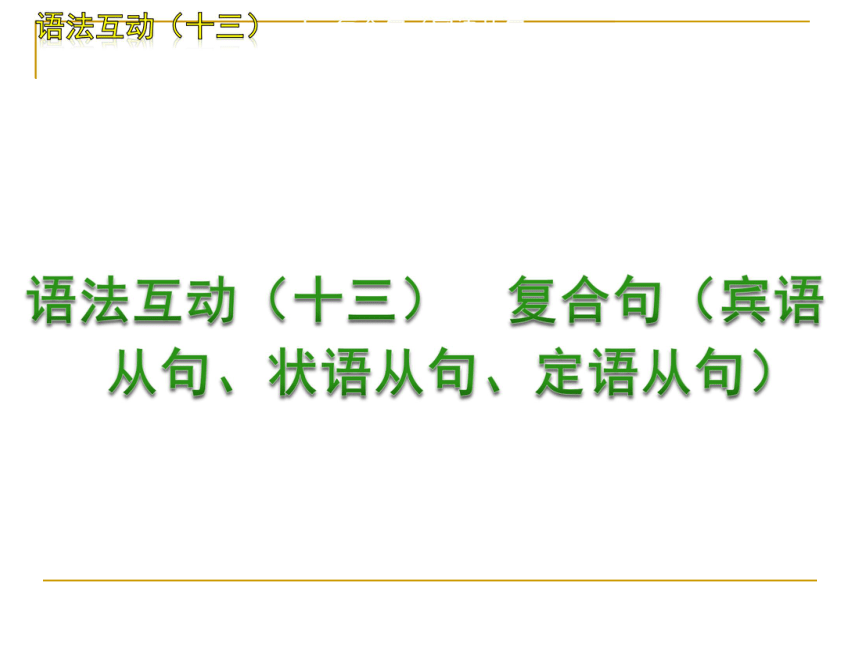 | |
| 格式 | zip | ||
| 文件大小 | 319.8KB | ||
| 资源类型 | 教案 | ||
| 版本资源 | 通用版 | ||
| 科目 | 英语 | ||
| 更新时间 | 2012-03-04 20:44:07 | ||
图片预览


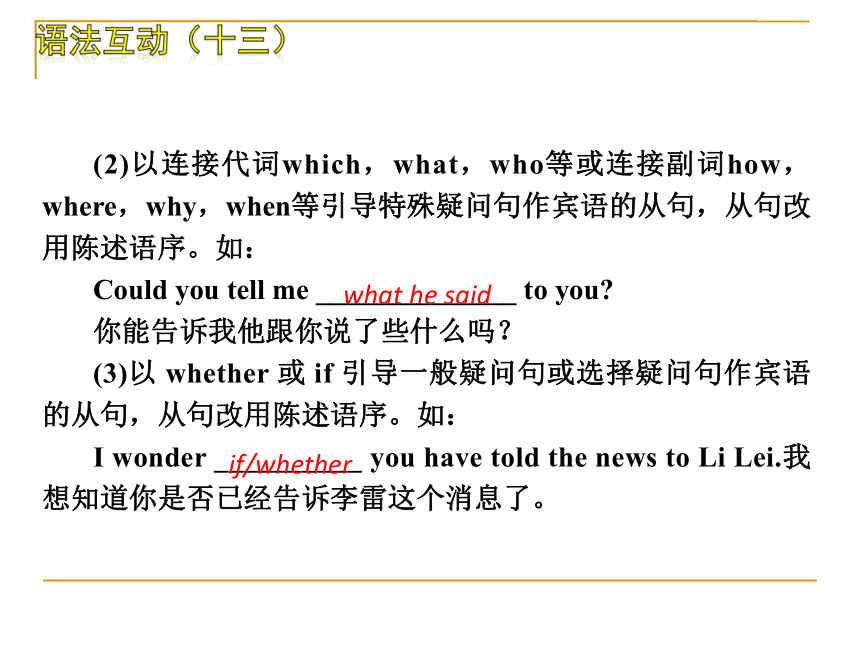
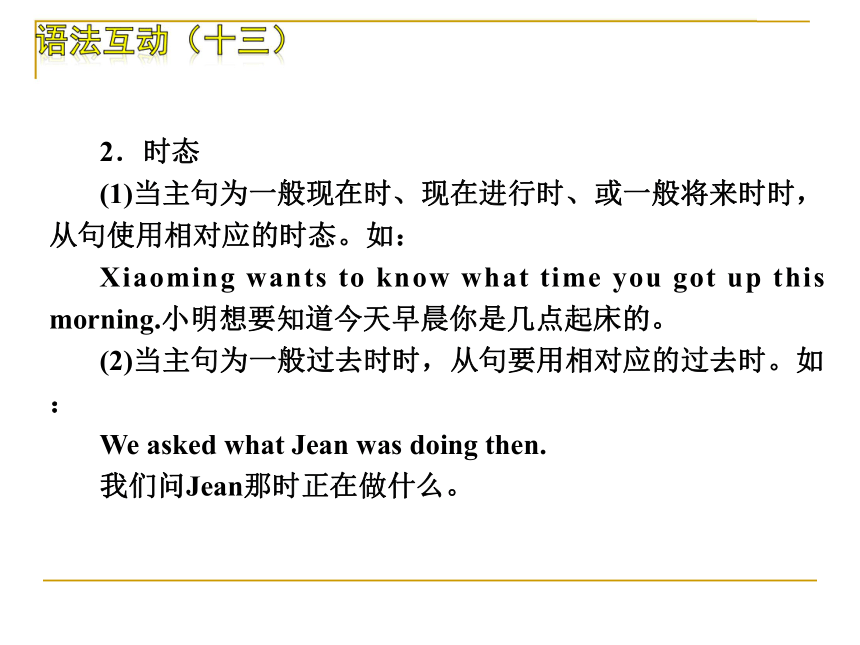
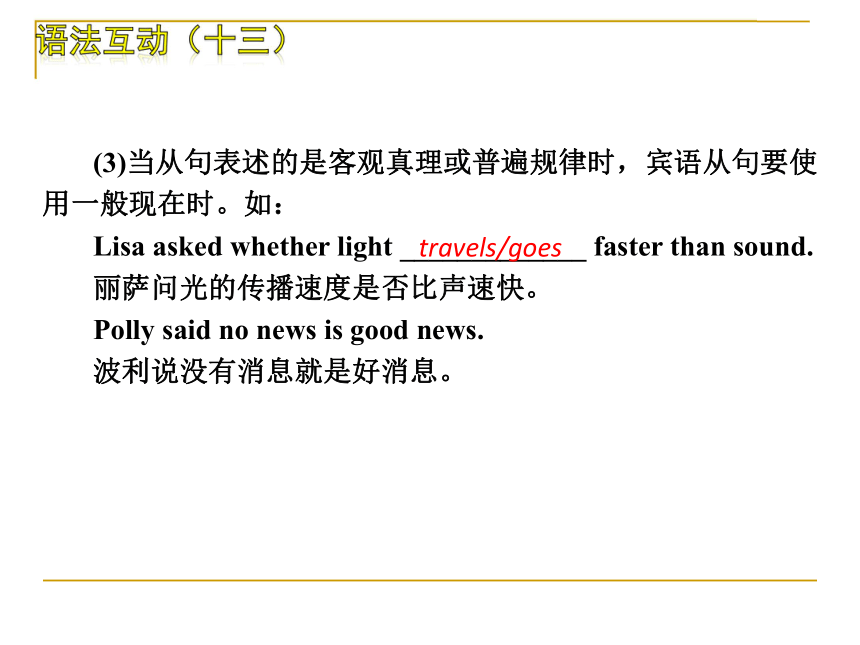

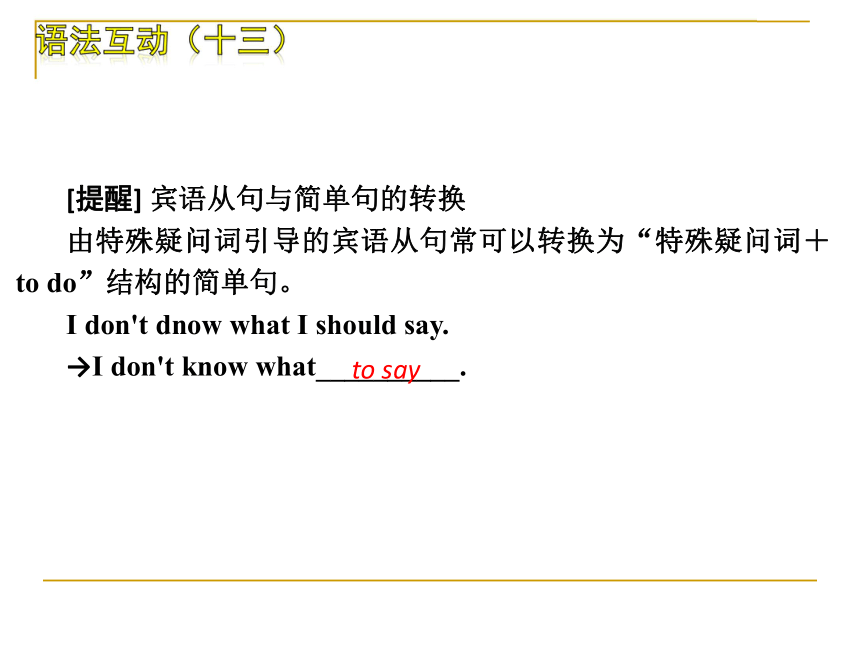
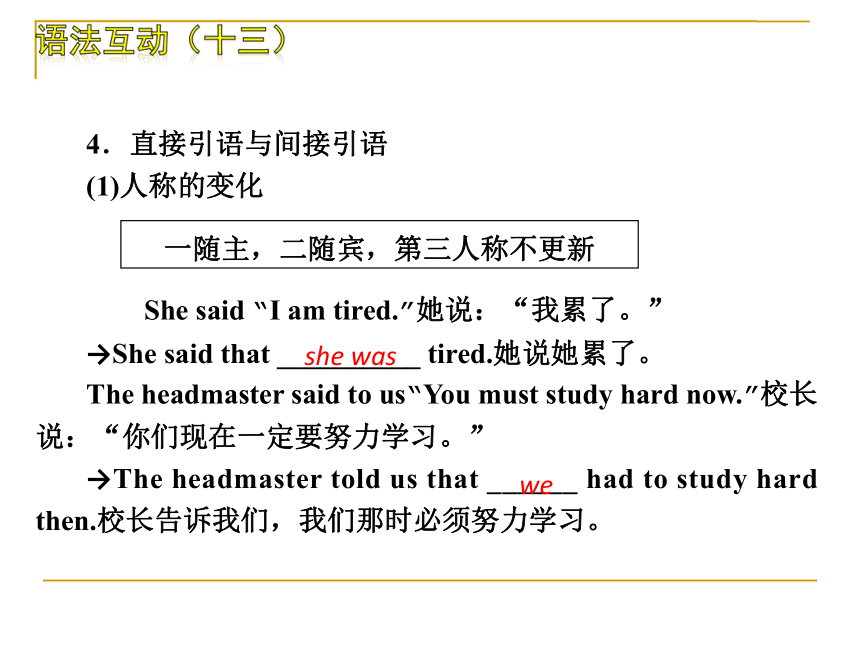
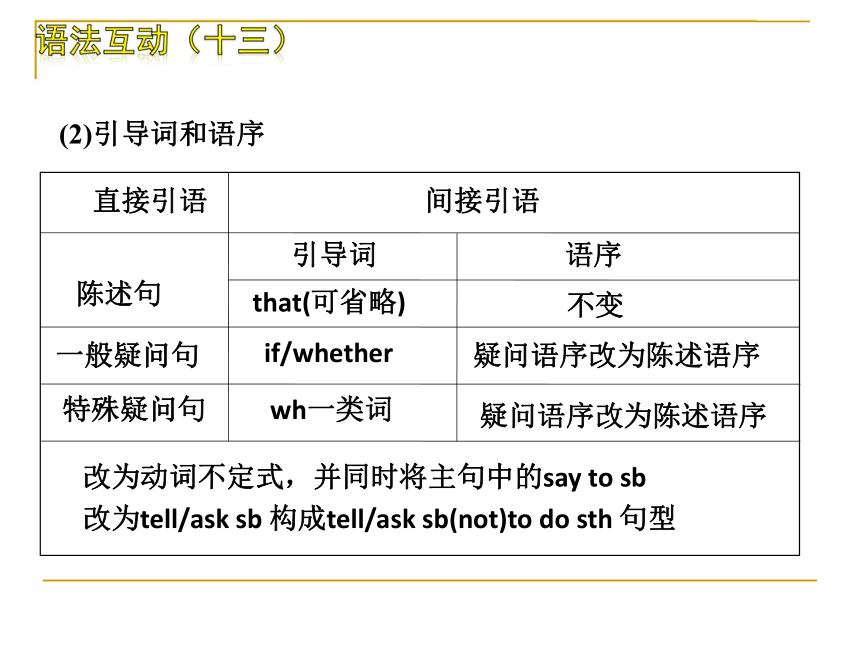
文档简介
(共24张PPT)
·译林牛津版
·译林牛津版
课标考点
1.掌握宾语从句的分类及其用法。
2.掌握状语从句的分类及其用法。
3.掌握定语从句的分类及其用法。
考点一:宾语从句
1.引导词
(1)在以that 引导的宾语从句中,若是that引导陈述句作宾语,that可以省略。如:
The radio says (that) it will rain tomorrow.
收音机报道说明天要下雨。
·译林牛津版
(2)以连接代词which,what,who等或连接副词how,where,why,when等引导特殊疑问句作宾语的从句,从句改用陈述语序。如:
Could you tell me ______________ to you
你能告诉我他跟你说了些什么吗?
(3)以 whether 或 if 引导一般疑问句或选择疑问句作宾语的从句,从句改用陈述语序。如:
I wonder __________ you have told the news to Li Lei.我想知道你是否已经告诉李雷这个消息了。
what he said
if/whether
·译林牛津版
2.时态
(1)当主句为一般现在时、现在进行时、或一般将来时时,从句使用相对应的时态。如:
Xiaoming wants to know what time you got up this morning.小明想要知道今天早晨你是几点起床的。
(2)当主句为一般过去时时,从句要用相对应的过去时。如:
We asked what Jean was doing then.
我们问Jean那时正在做什么。
·译林牛津版
(3)当从句表述的是客观真理或普遍规律时,宾语从句要使用一般现在时。如:
Lisa asked whether light _____________ faster than sound.
丽萨问光的传播速度是否比声速快。
Polly said no news is good news.
波利说没有消息就是好消息。
travels/goes
·译林牛津版
3.语序
(1)陈述句改为宾语从句,语序不变,即仍用陈述语序。
He is a good boy. The teacher said. →The teacher said (that) he was a good boy.
(2)一般疑问句和特殊疑问句改为宾语从句,语序改为陈述语序。
Does he work hard?I wonder.→I wonder if/whether ______________.
When did he leave?I don't know. →I don't know when he left.
he works hard
·译林牛津版
[提醒] 宾语从句与简单句的转换
由特殊疑问词引导的宾语从句常可以转换为“特殊疑问词+to do”结构的简单句。
I don't dnow what I should say.
→I don't know what__________.
to say
·译林牛津版
4.直接引语与间接引语
(1)人称的变化
She said “I am tired.”她说:“我累了。”
→She said that __________ tired.她说她累了。
The headmaster said to us“You must study hard now.”校长说:“你们现在一定要努力学习。”
→The headmaster told us that ______ had to study hard then.校长告诉我们,我们那时必须努力学习。
一随主,二随宾,第三人称不更新
she was
we
·译林牛津版
(2)引导词和语序
直接引语
间接引语
陈述句
引导词
that(可省略)
一般疑问句
特殊疑问句
if/whether
疑问语序改为陈述语序
语序
不变
疑问语序改为陈述语序
wh一类词
改为动词不定式,并同时将主句中的say to sb
改为tell/ask sb 构成tell/ask sb(not)to do sth 句型
·译林牛津版
(3)时态的变化
直接引语变为间接引语时,间接引语的时态要与主句的时态一致。其规律一般是:
一般现在时——一般过去时
一般过去时——过去完成时
一般将来时——过去将来时
现在进行时——过去进行时
现在完成时——过去完成时
过去完成时——不变
将来进行时——过去将来进行时
将来完成时——过去将来完成时
·译林牛津版
(4)指示代词、时间和地点状语等的变化
this—that
these—those
now—__________
today—that day
tonight—__________
this week(year,term)—_____________________
yesterday—__________
last week(year,term)—the week(year,term)before
two years ago—_______________
tomorrow—the next(following)day
next week(year,term)—the next week(year,term)
here—__________ come—__________ bring—__________
then
that night
that week(year, term)
the day before
two years before
there
go
take
·译林牛津版
考点二:状语从句
1.用法分类
(1)时间状语从句
由when,before,after,until,as soon as,while,as,since 等引导的状语从句叫做时间状语从句。如:
I feel very happy ______ I meet my friends again.
当我再次遇见我的朋友们时我感到很高兴。
We have made many dumplings ______ we began to cook. 自从我们开始做饭,我们已经包了许多饺子了。
He didn't go to bed ______ he finished his homework.
他直到做完作业才睡觉。(go to bed 表示的动作不能持续)
when
since
until
·译林牛津版
I'll call him __________ he comes back.
他一回来我就给他打电话。
Father was cleaning the car ______ I was playing computer games.
当我正在打电子游戏时,爸爸正在清洗汽车。
(2)条件状语从句
由if(如果)引导的状语从句,叫做条件状语从句。
______ it doesn‘t rain tomorrow,we will go there by bike.如果明天不下雨,我们就骑自行车去那里。
as soon as
while
If
·译林牛津版
从句名称 引导词
地点状语从句 where,wherever
原因状语从句 because,as和since(既然)
目的状语从句 so that(以便),in order that(为了,目的是)
让步状语从句 though(虽然),although(虽然),even if=even though(即使)
比较状语从句 than,as…as,not so/as…as…
结果状语从句 that,so that,so…that,such…that(以至于……)
(3)其他状语从句及其引导词
·译林牛津版
2.主句与从句时态一致的问题
在时间状语从句和条件状语从句中,主句和从句之间的时态一致问题一般分为下列两种情况:
(1)主现从现:若主句是祈使句,或主句中有情态动词时,那么从句用一般现在时表示将来。如:
Be careful when you cross the road.
过马路时要小心。
The traffic must stop when the lights ____________.
当红灯亮时,车辆必须停下。
are/ turn red
·译林牛津版
(2)主将从现:主句用一般将来时,而从句用一般现在时。如:
I will visit my good friend when I ______ time.
当我有时间时,我将去看望我的好友。
If she ______ here tomorrow,I will go to the park with her. 如果明天她来这里,我将和她一起去公园。
(3)宾语从句和状语从句同时出现
I don't know if(是否)he will come.If(如果)he comes,I will tell him about the accident. 我不知道他是否要来。如果他来,我将告诉他这起事故。
I don't know when(什么时候)he will come tomorrow. When(当……的时候)he comes,I will tell him about the news. 我不知道他明天什么时候来。当他来时,我将告诉他这个消息。
have
comes
·译林牛津版
(4)过去时态:若主从句都是在叙述过去的事情,则主从句可以用一般过去时,或过去进行时。
Mother was cooking when I got home yesterday.
昨天我到家时,妈妈正在做饭。
3.引导词与连词的使用
because与so不能同时用在一个主、从复合句中;although/though与but不能同时用在一个主从复合句中。
Though/Although it was late,they kept working.
尽管很晚了,他们仍然继续工作。
·译林牛津版
考点三:定语从句
引导定语从句的关系代词有who(whose,whom),which,that; 关系副词有when,where,why。
作主语 作宾语 作定语
指人 who/that who/whom/that whose
指物 which/that which/that whose
1.关系代词的基本用法
·译林牛津版
2.关系代词的特殊用法
that和which都可以修饰表示物的先行词,有的只能用that,有的只能用which。
(1)下列情况只能用that
①先行词为不定代词all,few,little,much,everything,nothing 等。如:
All (that)you have to do is to practise every day.
There isn't much (that) I can do.
②先行词被序数词或形容词的最高级所修饰时。如:
The first lesson (that) I learned will never be forgotten.
This is the best film (that) I have ever seen.
·译林牛津版
③先行词被all,any,every,few,little,no,some 等不定代词修饰时。如:
I have read all the books (that) you gave me.
④先行词被the only,the very,the last,the same 等修饰时。如:
The white flower is the only one that I really like.
This is the very book ______ I want to read.
This is the same skirt that I want to buy.(同一条裙子)
that
·译林牛津版
⑤当主句是以who或 which 开头的特殊疑问句时,定语从句用that 引导。如:
Who is the man that is standing there
Which of us that knows something about physics doesn't know this
⑥先行词既有人又有物时。
We talked about the persons and things ______ we could remember.
that
·译林牛津版
⑦time作先行词,前面如果有序数词或 last 来修饰时,定语从句用 that 来引导或省略;如果没有序数词或 last 来修饰时,既可用 when 也可用that来引导。
This is the last time (that) I shall give you a lesson.
The first time (that) I saw him was in 1972.
(2)下列情况只能用 which
①关系代词作介词的宾语时,用“介词+which”的结构。
This is the book for __________ you ask. 这是你要的书。
②引导非限制性定语从句时,只能用which。
This novel,which I have read three times,is very touching.
这本小说很动人,我已经读了三遍。
which
·译林牛津版
3.关系副词的用法
(1)when引导的定语从句,修饰表示时间的先行词。
I still remember the day ______ I first came to Beijing.我仍然记得来北京的第一天。
(2)where 在句中作状语,表示地点。
This is the factory ______ I worked two years ago.
这就是我两年前工作的那个工厂。
(3)why在句中作状语,表示原因。
I know the reason ______ he came late.
我知道他来晚的原因。
when
where
why
·译林牛津版
·译林牛津版
课标考点
1.掌握宾语从句的分类及其用法。
2.掌握状语从句的分类及其用法。
3.掌握定语从句的分类及其用法。
考点一:宾语从句
1.引导词
(1)在以that 引导的宾语从句中,若是that引导陈述句作宾语,that可以省略。如:
The radio says (that) it will rain tomorrow.
收音机报道说明天要下雨。
·译林牛津版
(2)以连接代词which,what,who等或连接副词how,where,why,when等引导特殊疑问句作宾语的从句,从句改用陈述语序。如:
Could you tell me ______________ to you
你能告诉我他跟你说了些什么吗?
(3)以 whether 或 if 引导一般疑问句或选择疑问句作宾语的从句,从句改用陈述语序。如:
I wonder __________ you have told the news to Li Lei.我想知道你是否已经告诉李雷这个消息了。
what he said
if/whether
·译林牛津版
2.时态
(1)当主句为一般现在时、现在进行时、或一般将来时时,从句使用相对应的时态。如:
Xiaoming wants to know what time you got up this morning.小明想要知道今天早晨你是几点起床的。
(2)当主句为一般过去时时,从句要用相对应的过去时。如:
We asked what Jean was doing then.
我们问Jean那时正在做什么。
·译林牛津版
(3)当从句表述的是客观真理或普遍规律时,宾语从句要使用一般现在时。如:
Lisa asked whether light _____________ faster than sound.
丽萨问光的传播速度是否比声速快。
Polly said no news is good news.
波利说没有消息就是好消息。
travels/goes
·译林牛津版
3.语序
(1)陈述句改为宾语从句,语序不变,即仍用陈述语序。
He is a good boy. The teacher said. →The teacher said (that) he was a good boy.
(2)一般疑问句和特殊疑问句改为宾语从句,语序改为陈述语序。
Does he work hard?I wonder.→I wonder if/whether ______________.
When did he leave?I don't know. →I don't know when he left.
he works hard
·译林牛津版
[提醒] 宾语从句与简单句的转换
由特殊疑问词引导的宾语从句常可以转换为“特殊疑问词+to do”结构的简单句。
I don't dnow what I should say.
→I don't know what__________.
to say
·译林牛津版
4.直接引语与间接引语
(1)人称的变化
She said “I am tired.”她说:“我累了。”
→She said that __________ tired.她说她累了。
The headmaster said to us“You must study hard now.”校长说:“你们现在一定要努力学习。”
→The headmaster told us that ______ had to study hard then.校长告诉我们,我们那时必须努力学习。
一随主,二随宾,第三人称不更新
she was
we
·译林牛津版
(2)引导词和语序
直接引语
间接引语
陈述句
引导词
that(可省略)
一般疑问句
特殊疑问句
if/whether
疑问语序改为陈述语序
语序
不变
疑问语序改为陈述语序
wh一类词
改为动词不定式,并同时将主句中的say to sb
改为tell/ask sb 构成tell/ask sb(not)to do sth 句型
·译林牛津版
(3)时态的变化
直接引语变为间接引语时,间接引语的时态要与主句的时态一致。其规律一般是:
一般现在时——一般过去时
一般过去时——过去完成时
一般将来时——过去将来时
现在进行时——过去进行时
现在完成时——过去完成时
过去完成时——不变
将来进行时——过去将来进行时
将来完成时——过去将来完成时
·译林牛津版
(4)指示代词、时间和地点状语等的变化
this—that
these—those
now—__________
today—that day
tonight—__________
this week(year,term)—_____________________
yesterday—__________
last week(year,term)—the week(year,term)before
two years ago—_______________
tomorrow—the next(following)day
next week(year,term)—the next week(year,term)
here—__________ come—__________ bring—__________
then
that night
that week(year, term)
the day before
two years before
there
go
take
·译林牛津版
考点二:状语从句
1.用法分类
(1)时间状语从句
由when,before,after,until,as soon as,while,as,since 等引导的状语从句叫做时间状语从句。如:
I feel very happy ______ I meet my friends again.
当我再次遇见我的朋友们时我感到很高兴。
We have made many dumplings ______ we began to cook. 自从我们开始做饭,我们已经包了许多饺子了。
He didn't go to bed ______ he finished his homework.
他直到做完作业才睡觉。(go to bed 表示的动作不能持续)
when
since
until
·译林牛津版
I'll call him __________ he comes back.
他一回来我就给他打电话。
Father was cleaning the car ______ I was playing computer games.
当我正在打电子游戏时,爸爸正在清洗汽车。
(2)条件状语从句
由if(如果)引导的状语从句,叫做条件状语从句。
______ it doesn‘t rain tomorrow,we will go there by bike.如果明天不下雨,我们就骑自行车去那里。
as soon as
while
If
·译林牛津版
从句名称 引导词
地点状语从句 where,wherever
原因状语从句 because,as和since(既然)
目的状语从句 so that(以便),in order that(为了,目的是)
让步状语从句 though(虽然),although(虽然),even if=even though(即使)
比较状语从句 than,as…as,not so/as…as…
结果状语从句 that,so that,so…that,such…that(以至于……)
(3)其他状语从句及其引导词
·译林牛津版
2.主句与从句时态一致的问题
在时间状语从句和条件状语从句中,主句和从句之间的时态一致问题一般分为下列两种情况:
(1)主现从现:若主句是祈使句,或主句中有情态动词时,那么从句用一般现在时表示将来。如:
Be careful when you cross the road.
过马路时要小心。
The traffic must stop when the lights ____________.
当红灯亮时,车辆必须停下。
are/ turn red
·译林牛津版
(2)主将从现:主句用一般将来时,而从句用一般现在时。如:
I will visit my good friend when I ______ time.
当我有时间时,我将去看望我的好友。
If she ______ here tomorrow,I will go to the park with her. 如果明天她来这里,我将和她一起去公园。
(3)宾语从句和状语从句同时出现
I don't know if(是否)he will come.If(如果)he comes,I will tell him about the accident. 我不知道他是否要来。如果他来,我将告诉他这起事故。
I don't know when(什么时候)he will come tomorrow. When(当……的时候)he comes,I will tell him about the news. 我不知道他明天什么时候来。当他来时,我将告诉他这个消息。
have
comes
·译林牛津版
(4)过去时态:若主从句都是在叙述过去的事情,则主从句可以用一般过去时,或过去进行时。
Mother was cooking when I got home yesterday.
昨天我到家时,妈妈正在做饭。
3.引导词与连词的使用
because与so不能同时用在一个主、从复合句中;although/though与but不能同时用在一个主从复合句中。
Though/Although it was late,they kept working.
尽管很晚了,他们仍然继续工作。
·译林牛津版
考点三:定语从句
引导定语从句的关系代词有who(whose,whom),which,that; 关系副词有when,where,why。
作主语 作宾语 作定语
指人 who/that who/whom/that whose
指物 which/that which/that whose
1.关系代词的基本用法
·译林牛津版
2.关系代词的特殊用法
that和which都可以修饰表示物的先行词,有的只能用that,有的只能用which。
(1)下列情况只能用that
①先行词为不定代词all,few,little,much,everything,nothing 等。如:
All (that)you have to do is to practise every day.
There isn't much (that) I can do.
②先行词被序数词或形容词的最高级所修饰时。如:
The first lesson (that) I learned will never be forgotten.
This is the best film (that) I have ever seen.
·译林牛津版
③先行词被all,any,every,few,little,no,some 等不定代词修饰时。如:
I have read all the books (that) you gave me.
④先行词被the only,the very,the last,the same 等修饰时。如:
The white flower is the only one that I really like.
This is the very book ______ I want to read.
This is the same skirt that I want to buy.(同一条裙子)
that
·译林牛津版
⑤当主句是以who或 which 开头的特殊疑问句时,定语从句用that 引导。如:
Who is the man that is standing there
Which of us that knows something about physics doesn't know this
⑥先行词既有人又有物时。
We talked about the persons and things ______ we could remember.
that
·译林牛津版
⑦time作先行词,前面如果有序数词或 last 来修饰时,定语从句用 that 来引导或省略;如果没有序数词或 last 来修饰时,既可用 when 也可用that来引导。
This is the last time (that) I shall give you a lesson.
The first time (that) I saw him was in 1972.
(2)下列情况只能用 which
①关系代词作介词的宾语时,用“介词+which”的结构。
This is the book for __________ you ask. 这是你要的书。
②引导非限制性定语从句时,只能用which。
This novel,which I have read three times,is very touching.
这本小说很动人,我已经读了三遍。
which
·译林牛津版
3.关系副词的用法
(1)when引导的定语从句,修饰表示时间的先行词。
I still remember the day ______ I first came to Beijing.我仍然记得来北京的第一天。
(2)where 在句中作状语,表示地点。
This is the factory ______ I worked two years ago.
这就是我两年前工作的那个工厂。
(3)why在句中作状语,表示原因。
I know the reason ______ he came late.
我知道他来晚的原因。
when
where
why
同课章节目录
- 词法
- 名词
- 动词和动词短语
- 动词语态
- 动词时态
- 助动词和情态动词
- 非谓语动词
- 冠词
- 代词
- 数词和量词
- 形容词副词及其比较等级
- 介词和介词短语
- 连词和感叹词
- 构词法
- 相似、相近词比较
- 句法
- 陈述句
- 一般疑问句和否定疑问句
- 特殊疑问句及选择疑问句
- 反意疑问句
- 存在句(There be句型)
- 宾语从句
- 定语从句
- 状语从句
- 主谓一致问题
- 简单句
- 并列句
- 复合句
- 主谓一致
- 主、表语从句
- 名词性从句
- 直接引语和间接引语
- 虚拟语气
- 感叹句
- 强调句
- 倒装句
- 祈使句
- 句子的成分
- 句子的分类
- 题型专区
- 单项选择部分
- 易错题
- 完形填空
- 阅读理解
- 词汇练习
- 听说训练
- 句型转换
- 补全对话
- 短文改错
- 翻译
- 书面表达
- 任务型阅读
- 语法填空
- 其他资料
